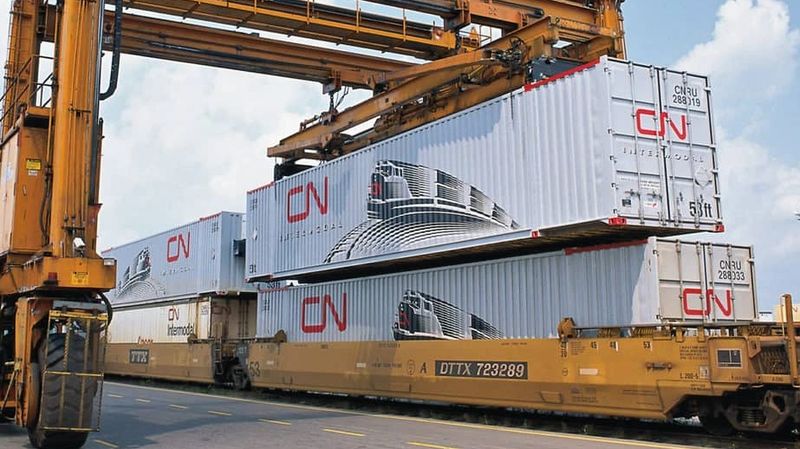This post was last updated on October 2nd, 2023
Intermodal carriers are an important part of the transportation industry. They’re a vital service and organizations looking for efficient freight transportation across North America should not overlook the intermodal shipping industry.
It’s not about picking a single mode of transportation or expediting the delivery of your items. It’s about choosing the best of each transportation mode and determining an efficient and secure way to transport your products across the country.
And, for your business to flourish, you must pick a suitable intermodal carrier that can assist you properly.
This post aims to help you understand what an intermodal carrier is, who they serve, and how they function. We’ll also go through how you can collaborate with them to efficiently handle intermodal shipments across Canada and cross borders to the US.

Understanding the Intermodal Transportation Service
What is intermodal shipping?
Intermodal transportation involves the transfer of your cargo from Point A to Point B, using two or more modes of transportation, such as truck and rail.
What is meant by an intermodal shipment?
An intermodal shipment is cargo movement by several transportation modes via intermodal containers.
Intermodal shipments tend to travel over long distances as they typically move between regions or countries, so shippers need to pick an intermodal carrier that best suits their needs.
Who are the main actors of intermodal shipping?
First, you have the shipper or client looking for a cost-effective and efficient way to move their freight.
Then, you have the intermodal service provider, transporter, or carrier. This company provides the transportation mode between two points, trucking, railcar loading, or container shipping.
And finally, you have the freight forwarder. This company is an intermodal carrier’s partner, and they handle the waybill, booking, and all other intermodal paperwork. These intermodal service providers help link all of the carriers involved in the intermodal shipping of the merchandise.
What is the usual intermodal transportation process?
The intermodal transportation process usually starts with the shipper, who has a product they need to get from one destination (wholesaler or distribution centre) to another destination, typically the end consumer. Depending on budget and needs, the shipper will work with a freight forwarder to choose the best mode of transport.
Once the goods are picked up, a drayage service will take the intermodal container(s) to a terminal, where they will be transferred onto another mode of transportation, typically rail.
The intermodal carrier will then deliver the cargo to its final destination, where the containers are again transferred onto another transport mode or taken directly to the final consignee.
Working with an intermodal carrier is not as difficult as it may seem.
The key is to find a reliable intermodal freight forwarder with competitive rail prices that can act as a single point of contact to help you with your logistical supply chain.

Intermodal freight transportation in Canada
If you’re shipping domestic intermodal across Canada, you might want to have a look at our full-load rail service company, using the CP and CN railway system as a low-carbon footprint and cost-effective solution to deliver your goods easily.
From Montreal to Edmonton, Toronto to Vancouver, and everything else in between the east coast to the west, we, at RailGateway, can get your goods where they need to go and at the best rates possible.
We’re Canada’s number one choice for full-load intermodal rail transport shipping, and we’re here to help make the process as easy as possible.
Get a free intermodal quote for our services, and we’ll let you know if we’re a good fit for you.
What is an intermodal carrier?
What is a “carrier”?
A carrier is a business that transports passengers and cargo by land, air, or sea.
As the name suggests, Intermodal freight carriers facilitate things further by moving goods through intermodal containers, from one particular place to another, via several transportation modes.
This means they are experts at getting cargo from a ship onto a truck, then onto a railcar, and vice versa. But that’s not all! They can also collect your goods from an air cargo terminal if you need any last-minute intermodal shipment.
What are the responsibilities and services of an intermodal carrier?
Aside from transporting, intermodal carriers can also provide various services, including storage and transfers across modes of transportation to complete their mission.
At intermodal yards and other facilities, a carrier can arrange the use of cranes for stacking containers or the use of forklifts to move them around.
Finally, they may have warehouses strategically positioned near ocean ports and Canadian and American railroads, ensuring that whatever you need will be close by.
The best part about intermodal carriers?
They’re experts at optimizing routes for cost savings and efficiency, meaning they’ll always find the cheapest way to get your shipment where it needs to go.
Intermodal operators can often offer more flexible and environmentally friendly solutions than transporting your goods by truck alone.
How do they work with shippers and other intermodal providers?
An intermodal carrier may not work directly with the shipper in some cases. But are usually in direct contact with freight forwarders to find the best intermodal transportation solution for their customers.
These individuals will collaborate with them to book their services and manage and oversee the whole shipment process.
This way, shippers can focus on their business while freight forwarders take care of all the logistics.
Sounds great so far? So how do you get started?
Should you work with intermodal shipping carriers?
Who uses intermodal transportation providers?
Many businesses do!
From manufacturing firms to construction companies to e-commerce and retail businesses, if you’re looking for an efficient way to ship your products, then you should consider intermodal transportation.
How to work with intermodal carriers?
The best way to find an intermodal carrier is to reach out to a freight forwarder that can work with intermodal providers and railway operators on your behalf.
This way, you’ll get the help you need from experts who know how intermodal transportation works! Also, you might benefit from pooled volume discounts so that your shipment can be cheaper.
How can you benefit from working with intermodal carriers?
Working with intermodal carriers avoids high transit times, high transportation costs, wrong coordination, and other common problems when shipping through a single transportation mode.
Your intermodal carriers may help you save money by streamlining the transportation of your goods.
Other advantages to working with logistics companies for intermodal transport?
Sure!
Intermodal services are also a sustainable choice for businesses as you will be able to pick the most adapted transportation mode depending on your route.
For instance, you can reduce carbon emissions and congestion on the roads by choosing rail for the long haul rather than intermodal trucking services.
Rail service is also more secure and safer in extreme weather, transporting environmental hazards, and time-efficient when compared to shipping goods by truck.
However, intermodal trucking companies offer more flexibility to get your shipment to a specific area or directly to your warehouse. Trucks are then also necessary for the last mile delivery.
You would understand, moving freight by taking advantage of the best of each part of the transportation industry is the way to go!
Working with an intermodal carrier is a win-win situation. And that’s why we’re here to help with your intermodal rail shipping needs.
Daily, we work with medium to large-sized shippers and high-volume shippers to help them save time, money, and headaches on every step of their supply chain.
So, don’t hesitate to contact us if you have any questions or want to know more about intermodal carriers and the services we offer. Our experts would be happy to answer you!





